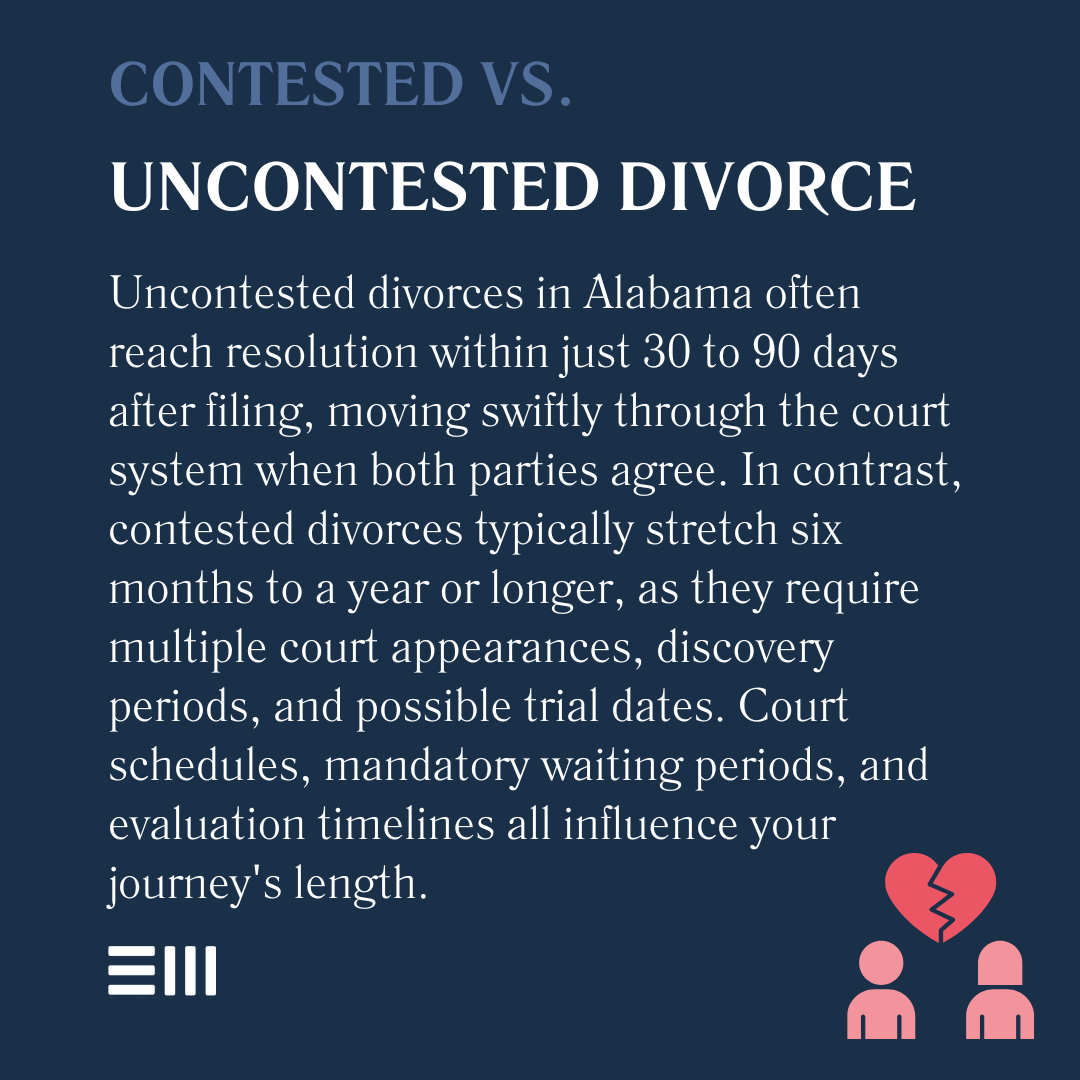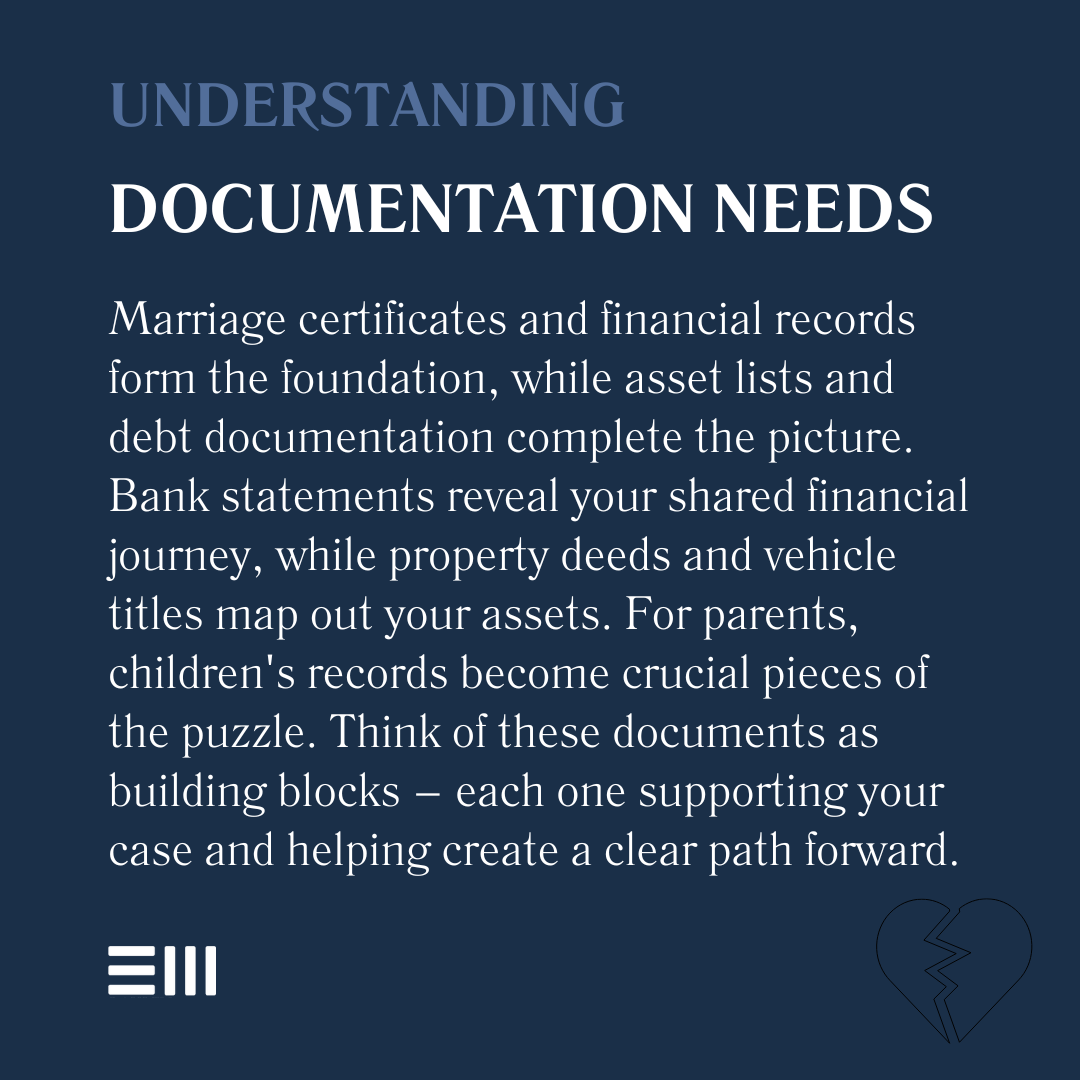The path through divorce reflects the unique story of each marriage's end. Some couples find common ground even in separation, while others face a more complex journey through the courts.
Understanding whether your divorce will be contested or uncontested shapes every aspect of the Alabama divorce process, from timeline to cost to emotional impact, ultimately determining the route to your new beginning.
Understanding Uncontested Divorce
An uncontested divorce represents the smoothest path through Alabama's legal system when ending a marriage.
This approach works best when both parties maintain open communication and share similar goals for their future, allowing for efficient resolution of all divorce-related matters.
- Both spouses agree on all major issues and settlement terms;
- Property division is mutually acceptable, including real estate and personal property;
- Child custody arrangements are settled, including visitation schedules and holidays;
- Spousal support terms are agreed upon, including amount and duration;
- Neither party disputes grounds for divorce or marriage dissolution;
- Joint submission of settlement agreement with complete terms;
- Financial disclosures are transparent and voluntarily shared;
- Both parties sign all necessary documents willingly;
- Agreement on tax implications and filing status;
- Division of retirement accounts and investments;
- Health insurance coverage transitions;
- Shared debt allocation and payment responsibilities;
- Pet custody and care arrangements;
- Agreement on children's educational decisions;
- Holiday and special occasion arrangements; and
- Communication methods post-divorce.
The cooperation required in uncontested divorces often leads to faster resolution and reduced legal costs while preserving the ability to maintain amicable relationships afterward.
Contested Divorce Overview
When spouses cannot reach an agreement on one or more significant issues, the divorce becomes contested, requiring more extensive legal involvement and court intervention.
This path involves more formal procedures and protections for both parties.
- Disagreement on property division and asset valuation;
- Disputes over child custody, visitation, and support arrangements;
- Conflict over alimony amount or duration;
- Disagreement about debt allocation and responsibility;
- Challenges to proposed settlement terms or divorce grounds;
- Need for court-ordered evaluations and assessments;
- Discovery process requirements and documentation;
- Multiple court appearances and hearings;
- Expert witness testimony for complex issues;
- Court-ordered mediation sessions;
- Depositions of parties and witnesses;
- Financial investigations and audits;
- Custody evaluations and home studies;
- Business valuation procedures;
- Temporary orders for support and custody; and
- Protection orders if necessary.
The complexity of contested divorces requires careful preparation and strategic legal planning to protect your interests throughout the process.
Timeline Comparisons
Understanding the typical duration of each divorce type helps set realistic expectations for the process ahead.
Various factors influence how quickly your divorce can be finalized, and knowing these timeframes helps with personal and professional planning.
- Uncontested: 30-90 days after filing, depending on court schedules;
- Contested: 6 months to over a year, sometimes extending multiple years;
- Mandatory waiting periods apply to both types of divorce;
- Court calendar and judge availability impact timing;
- Discovery process length varies based on complexity;
- Mediation sessions may extend the overall timeline;
- Trial scheduling depends on court backlog;
- Settlement negotiations may require multiple sessions;
- Judge's availability for hearings and trials;
- Document preparation and review time needed;
- Time for financial and custody evaluations;
- Appeals process if necessary;
- Cooling off periods between major decisions;
- Time for obtaining expert opinions;
- Property appraisal scheduling; and
- Financial document collection periods.
Proper planning and preparation can help maintain efficient progress through either process, though flexibility remains important.
Cost Considerations
The financial impact of divorce varies significantly between contested and uncontested cases.
Understanding these differences helps with budgeting and decision-making while preparing for both immediate and long-term expenses.
- Uncontested filing fees and basic court costs;
- Contested case attorney hours and retainer requirements;
- Expert witness expenses for specialized testimony;
- Court reporter costs for depositions and hearings;
- Mediation expenses and mediator fees;
- Property appraisal fees for real estate and businesses;
- Financial advisor costs for complex asset division;
- Document preparation fees and copying costs;
- Travel expenses for court appearances;
- Transcript costs for hearings and depositions;
- Guardian ad litem fees if children involved;
- Custody evaluator expenses;
- Private investigator fees if needed;
- Asset search costs;
- Forensic accountant fees; and
- Appeal-related expenses if necessary.
Careful consideration of costs helps inform decisions about how to proceed while ensuring adequate financial preparation.
Documentation Requirements
Both types of divorce require specific documentation, though contested cases typically demand more extensive records.
Proper organization and compilation of these documents streamline the process regardless of divorce type.
- Marriage certificate copies and official records;
- Financial disclosure forms with complete history;
- Asset inventory lists with supporting documentation;
- Debt documentation, including credit card statements;
- Income verification through pay stubs and W-2s;
- Tax returns for the past three to five years;
- Property deeds and mortgage statements;
- Vehicle titles and loan information;
- Insurance policies for all types of coverage;
- Bank statements for joint and individual accounts;
- Investment accounts and retirement plans;
- Business records, if applicable;
- Children's educational and medical records;
- Inheritance documentation;
- Gift records and proof of separate property;
- Communication records when relevant;
- Social media records, if pertinent;
- Electronic device and account passwords;
- Healthcare and insurance information; and
- Estate planning documents.
Thorough documentation supports smooth processing regardless of divorce type and helps prevent delays or complications.
Common Questions About Divorce Types in Alabama
Understanding the distinctions between contested and uncontested divorce in Alabama helps you make informed decisions about your situation.
These questions address common concerns about both paths.
How Do I Know Which Type to Choose?
Your ability to reach agreements with your spouse on major issues determines the appropriate path. Consider current communication levels and willingness to compromise.
Can a Divorce Change From Uncontested to Contested?
Yes, if agreements break down or new issues arise, an uncontested divorce may become contested. This typically requires additional legal procedures and documentation.
Does Fault Matter in Either Type?
Alabama allows both fault and no-fault grounds, regardless of whether the divorce is contested. Fault may impact property division and alimony decisions.
What if We Agree on Most Things but Not All?
Partial agreements can simplify contested divorces, though full agreement is needed for uncontested. Mediation often helps resolve remaining issues.
Can We Share an Attorney in an Uncontested Divorce?
No, ethical rules prevent one attorney from representing both parties. Each spouse should seek independent legal counsel.
Making Your Decision
Choosing between contested and uncontested divorce impacts every aspect of your case.
Consider these factors when determining your path forward to ensure the best possible outcome for your situation.
- Current communication level with spouse;
- Complexity of assets and debts to divide;
- Children's needs and custody arrangements;
- Time constraints and scheduling preferences;
- Financial resources available for legal fees;
- Emotional readiness for potential conflict;
- Support system strength and availability;
- Future relationship goals post-divorce;
- Professional obligations and flexibility;
- Privacy preferences and concerns;
- Willingness to negotiate and compromise;
- Understanding of financial situations;
- Ability to maintain civil discussions;
- Access to necessary documentation;
- Comfort with court appearances; and
- Need for specialized expertise.
Careful consideration of these factors supports informed decision-making about your divorce approach and helps prepare for the process ahead.
Build Your Path to Tomorrow
Navigating divorce requires both knowledge and support. Our experienced family law attorneys understand the nuances of both contested and uncontested divorce in Alabama.
We're here to guide you through whichever path best serves your situation, ensuring your rights and interests remain protected throughout the process.
Contact us for a confidential consultation to discuss your options and determine the most effective approach for your unique circumstances. Your future begins with understanding all available paths forward.


